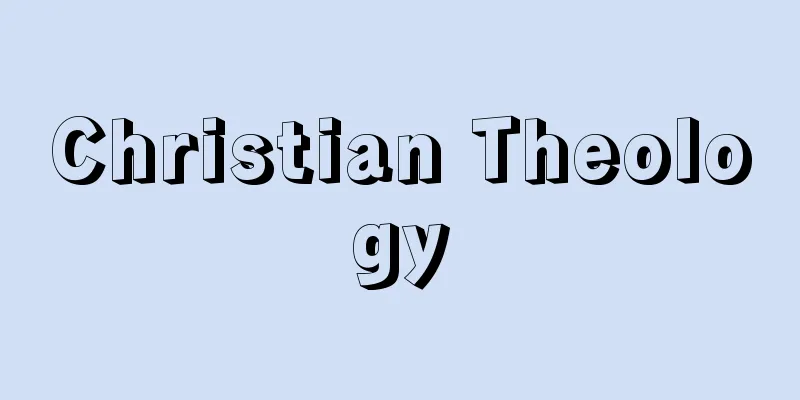Christian Theology

|
A study that focuses on the content of Christian beliefs. [Yoshinobu Kumazawa] Theology and its evolutionThe Greek word theologia, from which the term theology originates, is not originally a Christian term. In ancient Greek literature, it meant myths that told of the world of the gods and prophecies that conveyed the divine trust. In ancient Greek philosophy, theology was understood as a part of metaphysics, and in the Stoics, it also discussed the practical nature of the rituals of the city-states. It was by Greek apologists from the 2nd century onwards that it first appeared in Christian literature. However, even then, it was used in a pagan, not a Christian, sense. In ancient Christian times, for example, by Augustine, the word theology first began to be used in a Christian sense, but pagan meanings were also used in parallel. It was not until the Middle Ages that it came to refer primarily to Christian theology. [Yoshinobu Kumazawa] Christian Theological ConceptsTheology, theologia, originally meant the study of God, logos, even when it was Christianized, it meant theology in the sense of the study of the Christian God. However, when Christian theology asserted that there is a trinity of God as a distinctive feature compared to the theologies of Judaism and other religions, theology came to refer to the doctrine of the Trinity. Furthermore, as it is also included in the theology, since the Son (Jesus Christ), who is the second person of the Father, Son, and Holy Spirit, is God, theology also came to refer to Christology, discussions on His incarnation (taking on a human body), His divinity, and even His divinity and humanity. Since the incarnation was for the purpose of salvation, theology came to mean soteriology, and the term has a wide range from theology in the narrow sense, which means theology, to theology in the broad sense, which means all the teachings of Christianity. [Yoshinobu Kumazawa] The Nature of Christian TheologyAnselm (11th-12th century), Archbishop of Canterbury, said, "I believe because I do not know." These words clearly show the relationship between the rational knowledge of theology as an academic discipline and the subjective faith of those who engage in theology. Theology is an academic discipline that is established on the premise of subjective faith, and in this sense, it has a different character from academic disciplines that are simply rational activities. Therefore, Christian studies, which are a branch of religious studies, and theology have many things in common in terms of what is the object of study, but theology, which asks whether or not there is faith as a subjective condition, and Christian studies, which does not ask about it, are distinguished not in terms of the object but in terms of the subject. On the other hand, theology is also distinguished from simple faith that does not require academic verification. In this way, Christian theology has the character of an academic discipline based on Christian faith, which is distinguished from other academic disciplines, including religious studies and Christian studies, and from the practice of simple faith. This type of Christian theology was born out of the need for the Church, as a community of Christian faith, to constantly clarify its own position and undergo repeated academic verification, and it developed out of the struggle against heretical ideas, and therefore has become a fundamental characteristic of Christian theology. [Yoshinobu Kumazawa] History of Christian TheologyChristian theology as the study of the church developed in line with the development of the church. The flow of early religious organizations that was born in Jerusalem and developed in the Hellenistic world eventually became the Eastern Church (Greek Orthodox Church), which formed a theology characterized by metaphysical and mystical characteristics, in contrast to the theology of the Western Church (Roman Catholic Church), which has a strong rational and ethical nature. The 13th century culmination of the theology of the Western Church was Thomas Aquinas' Summa Theologica. Thomas' proposition that "grace does not destroy nature, but perfects it" advocates the harmony between the natural nature of human beings and God's supernatural grace, and it advocates the superiority of the latter over the general sciences based on the former, revealing the medieval characteristic of positioning the general sciences as the "handmaiden of theology." In the 16th century, the Western Church showed new developments with the Protestant Reformation, and the theology of the Church of England was born, which is characterized by a middle-way theology between Roman Catholicism and Protestantism. In contrast to Roman Catholic theology, Protestant theology developed with characteristics such as the exclusive authority of the Bible, salvation by God's exclusive grace (justification by faith), and the elimination of the status distinction between the sacred and the secular (the priesthood of all believers). It has formed theology with its own characteristics according to the trends of the Lutheran Church, the Reformed Church, and even various denominations in the United Kingdom and the United States. Calvin's Institutes of the Christian Religion is a classic compilation of Protestant theology. [Yoshinobu Kumazawa] Present and FutureSince the 4th century, when Emperor Constantine the Great officially recognized Christianity, theology in the Christian world that had been formed in Europe was greatly shocked by two world wars. After the Enlightenment, modern liberal theology had become extremely optimistic, progressive, and humanistic in the 19th century. However, World War I shocked the theology, which had realized that the Christian world was nothing more than an illusion. In 1918, the dialectical theology movement, centered around Swiss Protestant theologian K. Barth, who appeared with his The Book of Romans, finally found a way forward and ushered in a new era. Furthermore, after the experience of World War II, the theology began to take an active interest in the relationship between the church and the secular world. In Europe, R. Bultmann, who advocated the demythologization of the Christian gospel, and D. Bonhoeffer and F. Gogarten, who advocated secularization, were active, while in America, H. Cox, the theology of the death of God, and situational ethics struggled to deal with the modern world. From around the 1970s onwards, liberation theology was actively developed by European theologians of hope J. Moltmann, W. Pannenberg who advocated theology of history, and in America by process theologians and J. Cone. The Roman Catholic Church held the Second Vatican Council (1962-65), which reexamined the Church's role in the modern world, sought unity among all Christians, undertook internal renewal, and attempted to be open to other religions. Theology of the future will likely have to increasingly actively address issues of modernization, unity (ecumenism), innovation, and other religions. [Yoshinobu Kumazawa] Christian Theology in Japan and AsiaSince the arrival of missionaries in Japan in 1859 (Ansei 6), Protestant theologians have included Uemura Masahisa, who aimed to form an independent national church, Takakura Tokutarou, who tackled the modern ego, Kumano Yoshitaka, who left behind an academic system, and Kitamori Kazo, known worldwide for "Theology of God's Pain," while Catholic theologians include Iwashita Soichi and Yoshimitsu Yoshihiko. In Southeast Asia, the Asian principle of criticism, which critically accepts Western theology from an Asian perspective, has been preached, and Korean minjun theology, which focuses on the people, has been attracting attention. [Yoshinobu Kumazawa] "Catholic Theology" by Pierre Adonès, translated by Watanabe Yoshiaki (Hakusuisha, Que sais-je paperback)" ▽ "Protestant Theology" by Roger Maire, translated by Hagi Junichi (Hakusuisha, Que sais-je paperback)" ▽ "Protestant Theology in Modern Japan" by C. H. Germany, translated by Fuse Toyo (1982, United Church of Christ in Japan Publishing Bureau)" Source: Shogakukan Encyclopedia Nipponica About Encyclopedia Nipponica Information | Legend |
|
キリスト教の信仰内容を対象とする学問。 [熊澤義宣] 神学の語義と変遷神学という用語の起源となっているギリシア語のtheologiaは、元来はキリスト教の用語ではない。それは、古代ギリシア文学においては神々の世界のことを物語る神話であり、神々の信託を伝える預言を意味することばであった。神学は古代ギリシア哲学では形而上(けいじじょう)学の一部と理解され、ストア派においては都市国家の祭儀にかかわる実践的な性格をも論ずるものとなった。これがキリスト教文献に登場してくるのは、2世紀以後のギリシア弁証論者によってである。だが、その場合もキリスト教的な意味ではなく、異教的な意味で使われた。キリスト教古代、たとえばアウグスティヌスに至って、神学ということばが初めてキリスト教的な意味で用いられるようになるが、なお異教的なものも並行して用いられていた。これが主としてキリスト教神学を示すようになるのには中世を待たなくてはならなかった。 [熊澤義宣] キリスト教神学の概念神学theologiaは元来、神theosに関する学logosであるから、それがキリスト教化された場合でも、キリスト教の神に関する学という意味で神論を意味した。しかし、キリスト教神論がユダヤ教や他宗教の神論に対してもっている特色として、三位一体(さんみいったい)の神であることが主張されるに及んで、神学は三位一体論をさす語となった。さらに、そのなかにも含まれているように、父・子・聖霊の第二位格である子(イエス・キリスト)が神であるということから、神学はキリスト論、その受肉(インカーネーション。人間としての肉体をとること)に関する論議、その神性、さらにはその神性と人性に関する論議などをさす語ともなり、その受肉が救いのためであることから、神学は救済論を意味するものとなり、神論を意味する狭義の神学から、キリスト教のすべての教えを意味する広義の神学までの幅をもつ用語となった。 [熊澤義宣] キリスト教神学の性格カンタベリーの大司教であったアンセルムス(11~12世紀)は「知らんがために我信ず」と述べているが、このことばは、学問としての神学の理性的認識と、神学に携わる者のもっている主体的な信仰の関係が明確に示されている。神学とは主体的な信仰を前提として成立する学問なのであって、この意味で、単純に理性活動である学問とは違った性格をもつものである。したがって、宗教学の一分野であるキリスト教学と神学とは、対象とされているものに関しては多くの共通性をもつが、主体的な条件として信仰の有無を問う神学と、それを不問にするキリスト教学とは、対象面ではなくて、主体的面において区別される。他方、神学は学問的検証を問わない単純な信仰とも区別される。このようにキリスト教神学は、宗教学、キリスト教学をも含む他の諸学問とも、素朴な信仰の営みとも区別される、キリスト教信仰に基づく学問としての性格をもつ。このようなキリスト教神学は、キリスト者の信仰共同体としての教会が、絶えず、自らの立場を明らかにし、学問的に検証を重ねる必要から生まれ、異端思想との闘いのなかから展開していったために、教会性をもって基本的特色としてきたのである。 [熊澤義宣] キリスト教神学の歴史教会の学としてのキリスト教神学は、教会の展開に即して発展をしていったといえよう。エルサレムに誕生し、ヘレニズム世界に発展していった原始教団の流れは、やがて東方教会(ギリシア正教会)となり、西方教会(ローマ・カトリック教会)の神学が合理性、倫理性を強くもつのに対して、形而上学的性格、神秘性を特色とする神学を形成していった。西方教会の神学を集大成したのは、13世紀のトマス・アクィナスの『神学大全』であった。「恩恵は自然を破壊することなく、それを完成する」というトマスの命題は、人間の自然的本性と神の超自然的恩恵の調和を説くものであって、前者に基づく一般諸学に対する後者の優位性を説き、一般諸学を「神学の侍女」として位置づける中世的特色を明らかにするものであった。西方教会は、16世紀に至ってローマ・カトリック教会に対する宗教改革によって新しい展開を示し、ローマ・カトリックとプロテスタントとの間に中道の神学を特色とするイギリス国教会(イングランド教会)の神学も生まれた。プロテスタントの神学は、ローマ・カトリック神学に対して、聖書の排他的権威、神の排他的恩恵による救済(信仰義認論)、聖俗の身分的区別の排除(全信徒の祭司性)などを特色として発展し、ルター派教会、改革派教会の流れ、さらにはイギリス、アメリカ合衆国などにおける諸教派の流れにしたがってそれぞれの特色をもった神学を形成してきた。プロテスタント神学の古典的集大成としてはカルバンの『キリスト教綱要』がある。 [熊澤義宣] 現状と将来4世紀のコンスタンティヌス大帝のキリスト教公認以来、ヨーロッパに形成されてきたキリスト教世界における神学は、二度の世界大戦によって大きな衝撃を受けた。啓蒙(けいもう)主義時代を経て、19世紀にきわめて楽観主義的、進歩主義的、人間主義的になっていた近代自由主義神学は、第一次世界大戦によってキリスト教世界が幻想にすぎないことに衝撃を受け、1918年に『ロマ書』をもって登場したスイスのプロテスタント神学者K・バルトを中心とする弁証法神学運動によってやっと活路を得て新しい時代を迎えた。さらに、第二次大戦の経験を経て、教会と世俗世界の関係について積極的な関心をもつようになった。ヨーロッパではキリスト教福音(ふくいん)の非神話化を唱えたR・ブルトマンをはじめ、世俗化論を唱えたD・ボンヘッファー、F・ゴーガルテンなどが活躍し、アメリカではH・コックスや神の死の神学、状況倫理などが現代世界との取り組みに苦闘した。1970年代前後からはヨーロッパの希望の神学者J・モルトマン、歴史の神学を唱えたW・パンネンベルク、アメリカではプロセス神学者たちや、J・コーンなどの解放の神学が活発に展開されている。ローマ・カトリック教会では第二バチカン公会議(1962~65)を開き、現代世界に対する教会のあり方を再検討し、全キリスト者の一致を求め、内的に刷新し、他宗教に対しても開かれた姿勢をとろうとしている。将来の神学は、ますます現代化、一致(エキュメニズム)、革新、他宗教の問題を積極的に取り上げざるをえないだろう。 [熊澤義宣] 日本・アジアにおけるキリスト教神学1859年(安政6)の宣教師来日以来、自立的な国民教会の形成を志した植村正久、近代的自我と取り組んだ高倉徳太郎を経て、学問的体系を残した熊野義孝、『神の痛みの神学』で世界に知られる北森嘉蔵などがプロテスタント神学者として出ており、カトリック神学者としては岩下壮一、吉満義彦などが出た。東南アジアでは、西欧の神学をアジアの立場から批判的に受容するアジア的批判原理が説かれ、民衆に焦点を置く韓国の民衆(ミンジュン)の神学が注目されてきている。 [熊澤義宣] 『ピエール・アドネス著、渡辺義愛訳『カトリック神学』(白水社・文庫クセジュ)』▽『ロジェ・メール著、波木居純一訳『プロテスタント神学』(白水社・文庫クセジュ)』▽『C・H・ジャーマニー著、布施濤雄訳『近代日本のプロテスタント神学』(1982・日本基督教団出版局)』 出典 小学館 日本大百科全書(ニッポニカ)日本大百科全書(ニッポニカ)について 情報 | 凡例 |
>>: Young Women's Christian Association - Christian Young Women's Association
Recommend
Suringar, WFR (English spelling) SuringarWFR
...The colony is a somewhat hard agar-like substa...
Okie
...Zanuck, who was a Republican but also a close ...
Taglioni, F.
…A masterpiece of romantic ballet. In March 1832,...
Hososhima
A port town in Hyuga City in northern Miyazaki Pr...
Arnold Schönberg
Austrian composer. Together with his students Ber...
Ryoi Asai
A writer of kana zoshi in the early Edo period. H...
Shintaro Uda
Electrical engineer. Born in Toyama Prefecture. A...
Torii-shi
A feudal lord in the early modern period. Fudai. H...
《Horse Anatomy》
…Born in Liverpool, he started out as a portrait ...
Environmental accounting
It is a system for quantitatively calculating and...
Labor Court - Labor Court
Special courts for handling legal disputes related...
Reza'iye (English spelling)
…The city has a beautiful main mosque built durin...
Ryukoji Temple (English name) Long-yu-si
A large temple in Zhengding County, Hebei Province...
Mount Otenshodake
…It is also called Daitenjo-dake. It means the hi...
Jung, Carl Gustav
Born: July 26, 1875, Keswill Died: June 6, 1961, Z...









